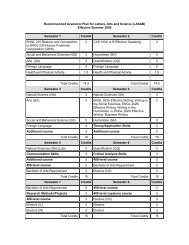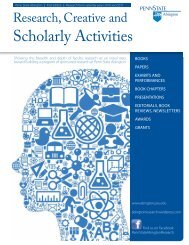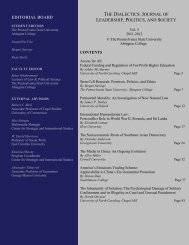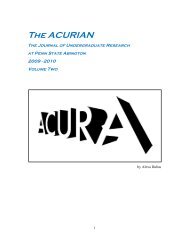Vol. III - Penn State Abington
Vol. III - Penn State Abington
Vol. III - Penn State Abington
Create successful ePaper yourself
Turn your PDF publications into a flip-book with our unique Google optimized e-Paper software.
an anthropological study on a particular religion, and the contents of the report were not liked by<br />
the members of that religious group, the followers of the religion could potentially make a claim<br />
against the Union for violating their Article II-82 rights.<br />
It is not clear in any of the above situations which Article of the proposed constitution<br />
would supersede the others. However, one article appears to suggest that the free expression<br />
clause of Article II-71 would lose out. Article II-112 states “Any limitation on the exercise of the<br />
rights and freedoms recognized by this Charter must be provided for by law and respect the<br />
essence of those rights and freedoms. Subject to the principle of proportionality, limitations may<br />
be made only if they are necessary and genuinely meet objectives of general interest recognized<br />
by the Union or the need to protect the rights and freedoms of others” (EU Constitution, 2004).<br />
Article II-112 highlights the general essence of the charter. It appears that the general essence of<br />
the charter has less to do with free expression and more to do with protecting human dignity. So,<br />
Articles II-61 (Human Dignity) , 63 (Right to Integrity of the Person), and 81 (Nondiscrimination)<br />
appear to have precedence over Article II-71, Freedom of Expression and<br />
Information..<br />
Additionally, Article II-112 supports limiting rights when the limitations meet another<br />
interest of the European Union. Again, it is clear, although not necessarily correct, that the<br />
constitution favors the interest of dignity over the interest of expression. Accordingly, the policy<br />
markers of the European Union would have an easy time limiting free expression by claiming<br />
their actions are justified as they protect human dignity or cultural diversity.<br />
Finally, the last section of Article II-112 seems to state that the constitution is more<br />
concerned with protecting passive individuals as opposed to active individuals. That is to say, the<br />
constitution is more concerned with protecting an individual’s right not be to subjected to certain<br />
expression, than to protect an individual’s right to pronounce that expression. This can be<br />
deduced from the language of “others.” This language seems to give predominance to the passive<br />
individual and not to particular active actors.<br />
The topics discussed show the internal conflicts that the European Union Constitution has<br />
when it comes to the issue of free expression. However, those are not the only problem the<br />
European Union faces on the issue. The European Court of Justice has also rendered some<br />
rulings that are not favorable towards free expression. First, consider the case of Magoora sp.<br />
zoo v Dyrektor Izby Skarbowej w Krakowie (2007). This case relates to the issue of criminal<br />
proceedings against a journalist regarding “dissemination of information about a medicinal<br />
product by a third party acting on his own initiative” (European Court Ruling, 2009), which the<br />
Court had ruled was akin to advertising, a violation of European Union medicinal law (European<br />
Commission, 2001). The information the journalist had published was a review for the health<br />
food product Hyben Total. Provided that a simple review of a product can violate such a law, or<br />
even having such a law, is absurd and can have long reached effects on journalism. One article<br />
claims that the court decision, “may entail extensive consequences for journalists, writers,<br />
doctors and others making statements on drugs” and then proceeds to offer a counter-example,<br />
“It is hard to imagine many statements that do not aim at promoting the prescription, dispensing,<br />
sale or consumption of a drug. If my uncle praises a drug, he will, in effect, be promoting<br />
consumption” (Ekstrand, 2009). Another article notes, the ruling may create, “a culture of fear,<br />
that journalists will decline from giving natural health products the coverage they had previously<br />
been able to give” (European Court Ruling, 2009). With this “culture of fear” in place, reporters<br />
will be unable to provide health food products reviews.<br />
THE DIALECTICS ▲ 2009<br />
www.abington.psu.edu/dialectics<br />
54







